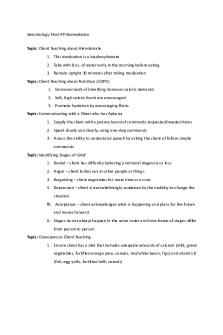ATI Medsurg practice b remediation PDF

| Title | ATI Medsurg practice b remediation |
|---|---|
| Author | Ashley Petersen |
| Course | Med Surg |
| Institution | Texas Lutheran University |
| Pages | 5 |
| File Size | 132.5 KB |
| File Type | |
| Total Downloads | 112 |
| Total Views | 172 |
Summary
Remediation questions and answers for ATI practice B for medsurg....
Description
ATI Medical-Surgical Practice B Remediation Management of Care Hyperthyroidism: Priority Finding for a Client Following a Thyroidectomy (Active Learning Template - Therapeutic Procedure) In the treatment of hyperthyroidism, the thyroid may be partially or totally removed to correct the condition and any symptoms as a result of the hormone imbalance. Following this procedure, it is important to support the neck of the patient. Do so by having the patient in semi-fowlers position and have the neck supported with pillows or sandbags. Extension of the neck should be avoided. VS should be monitored q15 minutes until stable, then q30 minutes. Deep breathing exercises should be performed once or twice an hour. Oral care and trach care should be performed as needed to allow for a patent airway. The incision, dressings and back of the neck should be assessed for excessive bleeding. Respiratory distress as a result of hemorrhage or edema can occur within the first 24 hours. If this were to occur, tracheostomy care should be readily available as well as equipment to provide oral care and suctioning if needed. The patient should be asked to speak as soon as they become conscious to assess for nerve damage and again q2h after. Pain medication should be given as needed. Hypocalcemia can occur as a result of the removal of parathyroid glands, so assessment for s/s of this imbalance should be performed. Safety and Infection Control Immune and Infectious Disorders Diagnostic Procedures: Providing Discharge Teaching About Infection Prevention to a Client Who Has AIDS (Active Learning Template - System Disorder) Patients with HIV/AIDS are very susceptible to infection due to being severely immunocompromised. Patients should be taught to perform proper and frequent hand hygiene to reduce the spread of bacteria and viruses. They should avoid crowds or traveling to areas with poor sanitation practices. Raw or undercooked foods should not be consumed. Patients with pets that use litter should avoid cleaning these containers to reduce the risk of toxoplasmosis. The patients’ home should be kept as clean as possible. They should avoid interacting with anyone that is currently sick or is fighting an infection. Patients should be taught details about the disease process and infection control measures including appropriate sex practices. Medications should be taken as prescribed and lab work should be done routinely to monitor CD4 and viral load counts. Any s/s of infection should be reported to the physician as soon as possible. Psychosocial Integrity Alzheimer's Disease: Teaching Family About Caring for a Parent Who Has Alzheimer's Disease (Active Learning Template - System Disorder) Families should be taught what to expect as the disease process progresses over time as care for them might change as patient’s condition does. The family should be encouraged to participate in an Alzheimer’s support group. The patient’s environment should be safe by removing potentially dangerous items, avoiding stair and elevators and by checking the environment frequently for hazards. A regular sleep schedule should be maintained to help orient the patient. Both verbal and nonverbal modes of communication should be used.
Overstimulation should be avoided by limiting noise, clutter and crowds. A clock, calendar, and family pictures should be placed where the patient can easily view them to help orient them. The patient should be spoken to in short, concise sentences to avoid confusion. Alzheimer’s patients can become easily agitated when confused so the family should interact with them in a calm manner. Basic Care and Comfort Kidney Transplant: Providing Teaching About Organ Donation (Active Learning Template Therapeutic Procedure) Candidates for kidney transplants are those that are dialysis dependent or have a GFR...
Similar Free PDFs

Leadership ATI Practice B
- 7 Pages

ATI Practice B - questions
- 42 Pages

ATI fundamentals practice B
- 14 Pages

ATI Fundamentals Practice B
- 5 Pages

ATI Remediation
- 9 Pages

NUR 232 ATI Remediation
- 7 Pages

ATI Leadership B practice exam
- 5 Pages

ATI Comprehensive Practice Test B
- 25 Pages

ATI Mental Health Practice B
- 8 Pages

Peds ATI Final Remediation
- 3 Pages

Gerontology ATI Remediation 1
- 2 Pages

Peds ATI remediation
- 9 Pages
Popular Institutions
- Tinajero National High School - Annex
- Politeknik Caltex Riau
- Yokohama City University
- SGT University
- University of Al-Qadisiyah
- Divine Word College of Vigan
- Techniek College Rotterdam
- Universidade de Santiago
- Universiti Teknologi MARA Cawangan Johor Kampus Pasir Gudang
- Poltekkes Kemenkes Yogyakarta
- Baguio City National High School
- Colegio san marcos
- preparatoria uno
- Centro de Bachillerato Tecnológico Industrial y de Servicios No. 107
- Dalian Maritime University
- Quang Trung Secondary School
- Colegio Tecnológico en Informática
- Corporación Regional de Educación Superior
- Grupo CEDVA
- Dar Al Uloom University
- Centro de Estudios Preuniversitarios de la Universidad Nacional de Ingeniería
- 上智大学
- Aakash International School, Nuna Majara
- San Felipe Neri Catholic School
- Kang Chiao International School - New Taipei City
- Misamis Occidental National High School
- Institución Educativa Escuela Normal Juan Ladrilleros
- Kolehiyo ng Pantukan
- Batanes State College
- Instituto Continental
- Sekolah Menengah Kejuruan Kesehatan Kaltara (Tarakan)
- Colegio de La Inmaculada Concepcion - Cebu



